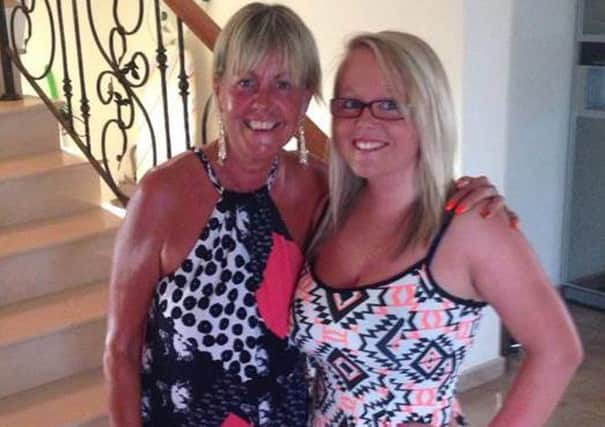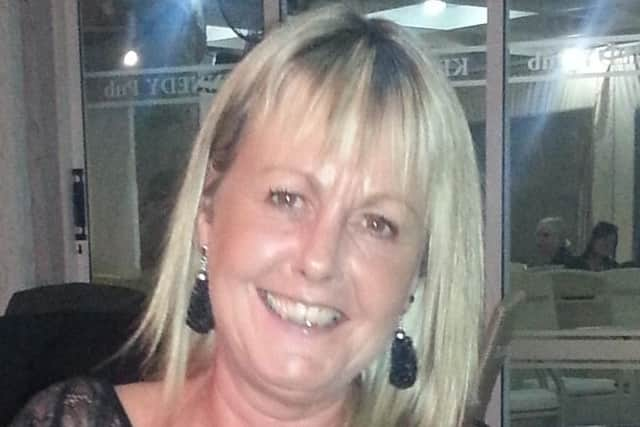Glasgow bin lorry: Trauma at seeing Edinburgh mum die


As she made her way back to the train station to return to the Capital with daughter Lucy, 52-year-old Gillian Ewing could have had no idea about the fate which was about to befall her.
In Scotland at Christmas for the first time four years, she was looking forward to the festive celebrations at home in Mortonhall with Lucy, her other daughter Robyn and her partner Ali.
Advertisement
Hide AdAdvertisement
Hide AdBut an out-of-control bin lorry took all that away – killing Gillian and five others who were in Queen Street on December 22 last year.


Lucy was standing “mere inches” away when her mum was hit by the runaway truck and could only watch in horror as she died before her eyes. Yesterday, eight months on from the tragedy, Lucy remains traumatised by what she witnessed that day, and has been unable to complete her university course.
A fatal accident inquiry at Glasgow Sheriff Court heard how Gillian had split her time between Cyprus and Edinburgh since 2009 after “falling in love” with the island during several family holidays. Alistair Forsyth QC spoke for the Ewings during his closing submission to the inquiry.
He said: “Lucy was mere inches from the lorry as it travelled across the pavement and she witnessed her mum being struck down.
“She was not injured but the sight has had a lasting impact.
“She has been unable to complete fourth year at university and can no longer go near areas with large crowds or a lot of noise.”
Mr Forsyth described Ms Ewing as a “loving mother, devoted partner and cherished daughter and sister”.
He told how Gillian – who worked in hotels and events management – “meant the world to her daughters” and was their best friend.
Advertisement
Hide AdAdvertisement
Hide AdShe was only in Glasgow that day, Mr Forsyth said, because one of her rings had been stolen months earlier and she wanted to go back to the same jewellery shop to see if she could get a replacement.
And praising the Ewing family for “conducting themselves with great dignity and courage” he added: “Gillian was a beautiful and kind-hearted woman, and is sorely missed by all who knew her.
A lawyer for another family, which lost three members in the bin lorry crash, told the inquiry yesterday that they “profoundly disagree” with the decision not to prosecute any party over the deaths.
Relatives of Erin McQuade and her grandparents Jack and Lorraine Sweeney said they were “devastated” by their deaths and expressed “great concern” over how the tragedy was investigated.
Mark Stewart QC said the family did not agree that it should have been treated as a road traffic accident and believe there should have been more involvement from the Health and Safety Executive.
Concerns were also raised over the fact that driver Harry Clarke was never interviewed by police after the crash.
Mr Stewart said: “This was an investigation conducted with remarkable haste.
“The conclusion of the Crown Office, announced nine weeks after the tragedy, that no basis in criminal law could be established to bring criminal proceedings is one with which the family profoundly disagree.”
Advertisement
Hide AdAdvertisement
Hide AdThe Crown Office said in February that no charges would be brought against Mr Clarke and the relevant information had been taken into account regarding a decision not to prosecute.
The family representative said relatives had found it “difficult to prepare for” the FAI and the speed with which it has been held has “placed them under heightened pressure in reliving the tragic circumstances”.
The inquiry heard that Erin, 18, and her grandparents had been Christmas shopping and out for lunch on the day of the crash.
They were described as a “close family” and the deaths had left relatives “devastated”.
Ms McQuade was a first-year student at the University of Glasgow where she was studying English literature. She was also said to be a talented artist and had previously volunteered to help sick people visit Lourdes.
Mr Sweeney, 68, had previously worked in Canada and was said to have enjoyed gardening, horse racing and family holidays. His wife, 69, had worked in a coffee shop and enjoyed shopping trips.
Mr Stewart told the inquiry that they cared for their grandchildren, including Ms McQuade’s three young siblings, and were close to their two daughters and their husbands.
At the end of his submission, Mr Stewart said: “It is submitted that the families who have attended court have done so with remarkable strength of character, grace and dignity.” Sheriff John Beckett said: “I would agree with that.”
Advertisement
Hide AdAdvertisement
Hide AdDuring his closing statement, Mr Forsyth also raised concerns over Glasgow City Council’s route risk assessments, which he said covered pick-up points rather than the specific route driven by lorries.
A lawyer representing the DVLA said the body had already started a review around its guidelines on fitness to drive and the period of restriction for licence revocations.
He said there were no “reasonable precautions” that the DVLA could have taken to prevent the crash last year and said recommendations that doctors should be compelled to report all medical issues to the DVLA could “potentially impact on the willingness of patients to seek medical advice”.
Peter Gray QC, for Glasgow City Council, said the approach taken to bin lorry route risk assessments was “entirely consistent with the Health and Safety Executive guidance”.
He said evidence given to the inquiry had shown that Glasgow was “frequently busy” with pedestrians, not just at Christmas time. He said the lorry crashed because the driver lost consciousness and, in terms of risk assessments, “there was nothing unusual about December 22 that would have made it necessary to alter the route for waste collections”.
On behalf of Glasgow City Council, Mr Gray finished his submission by expressing “deepest sympathies” to the families of the deceased and those who were injured in the crash.
He said: “They should be commended for the dignified way they have dealt with very difficult proceedings.”
Liam Ewing, representing bin lorry passengers Matthew Telford and Henry Toal, also offered condolences on behalf of his clients.
Advertisement
Hide AdAdvertisement
Hide AdHe said there were no reasonable precautions that could have been taken by the crewmen to prevent the accident.
“It was not possible for either passenger in the circumstances to pull the handbrake,” Mr Ewing said.
He added that evidence from crash experts had also shown that pulling the handbrake could have caused the lorry to skid and “might have led to further casualties”.
He concluded by referring to Mr Telford’s response during evidence when asked by the Solicitor General if there was anything he could have done differently.
Mr Ewing said: “He didn’t think he could have done anything differently but said he will always ask himself that question. That remains the position of both Mr Telford and Mr Toal.”
Minute’s silence for the fallen
THE six people who died in the pre-Christmas tragedy were remembered in a minute’s silence when the inquiry got under way at Glasgow Sheriff Court last month.
Sheriff John Beckett began proceedings by offering his condolences to relatives at the hearing and excused them from court when CCTV footage was shown of what one lawyer described as the “graphic and horrific” events of December 22 last year.
The footage showed the bin lorry mount the busy pavement filled with shoppers and skim a wall before it returned to the road and collided with cars.
Advertisement
Hide AdAdvertisement
Hide AdWitnesses on the day of the crash reported seeing the lorry driver slumped at the wheel as the vehicle mounted the pavement in Queen Street and careered up the road towards George Square, where it crashed into the Millennium Hotel.
The Crown Office ordered an FAI into the crash after prosecutors ruled there was no evidence to warrant criminal proceedings.
But relatives have since outlined their intention to pursue driver Harry Clarke in a private prosecution.
The council driver has faced claims that he was to blame for the crash by failing to advise doctors and employers about a history of dizzy spells and fainting.
The inquiry has heard Mr Clarke had experienced such episodes dating back to the 1970s and failed to note them when required on job application forms.
He is said to have given different accounts to doctors of a 2010 incident, telling one that he had fainted in his work canteen instead of behind the wheel of a bus.
The threat of court action meant he used his legal right not to answer questions relating to his medical and employment history despite pressure from relatives’ lawyers when he appeared before the inquiry last week. He also refused to offer an apology.